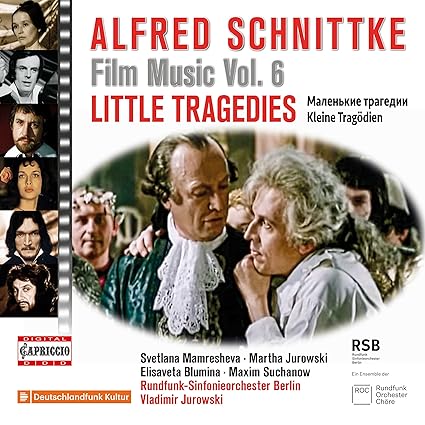

Alfred Schnittke (1934-1998): Chapter 1 Alfred Schnittke (1934-1998): Pushkin's "Scene from Faust" Alfred Schnittke (1934-1998): Egyptian Nights Alfred Schnittke (1934-1998): The Miserly Knight Alfred Schnittke (1934-1998): Mozart and Salieri Alfred Schnittke (1934-1998): The Stone Guest Alfred Schnittke (1934-1998): A Feast in Time of Plague
If you have never heard any of this composer's film music but are open to his 20th century polystylism then his film music is one way to get a gentle introduction to his many varied effects and impact. This disc gives an idea of the spread of styles, and in small chunks. 36 tracks, almost all less than 3 minutes, most less than 2 and one only 20 seconds. It is incidental music of course, so that's to be expected.
However, this would be denying the immediate attraction of many of the tracks. At one moment you can be listening to music reminiscent of 1960's French chanson (track 3) and then immediately afterwards a track that reminds you it's Schnittke (track 4)! Granted, that following track is the 20 second one, depicting an explosion, but you get the picture.
I am always interested and intrigued by this composer, and this example of his film music has not changed that at all. It's an entertaining listen. Other releases in this series have also received similar reactions and are worth exploring, especially as a simpler way into this intriguing composer.
Schnittke constantly keeps you off balance in interesting ways, an unexpected instrumental combination here, and surprising off note or key change there. He has a penchant on this disc for guitar (usually acoustic and a few times electric, electric always quiet, intricate and tasteful), harpsichord, flute, sometimes as solos sometimes in combination with strings. It reveals a clear sense of personality.
Written for a series of TV shows based on short stories by the great Russian poet Pushkin, the music moves between several luscious, languorous Viennese style waltzes, a gentle barcarolle, energetic polkas, improvised acoustic guitar solos, and fascinating songs, whose style is on the border of classical and popular. These latter are well sung by Svetlana Mamresheva, primarily known as an actress, and Martha Jurowski, the conductor's daughter who sings effectively a downbeat song from the appropriately titled 'A Feast in Time of Plague'.
As might be hoped, with such an inventive composer, one is never far from echoes of the major canons of classical music. One of the stories included is 'The Stone Guest', the Don Juan story, the death of whom is depicted in a short movement sounding like music from a Hitchcock horror movie, after a threatening march movement for the 'Commendatore'. In fact, as the accompanying booklet reminds us, all four of Alexander Pushkin's Little Tragedies - deeply rooted in the past yet have been set to music by Russian composers: • Mozart and Salieri by Nikolai Rimsky-Korsakov, • The Miserly Knight by Sergei Rachmaninoff, • The Stone Guest by Alexander Dargomyzhsky, • A Feast in Time of Plague by César Cui. The story of Mozart and Salieri, portraying the supposed poisoning of Mozart, enables Schnittke to include two short pieces based closely on Mozart's C minor Fantasy K.475, one an improvisation for piano and orchestra, the other a fragment, then ending in 'Chaos' a short (38 second) piece depicting the horror at the poisoning.
Conductor Mikail Jurowski has already conducted a recording of Schnittke's Symphony No. 3, and is a great advocate for this composer, and in this recording, along with the others in the series conducted by Frank Strobel, has shone a light on an otherwise neglected but fascinating part of the composer's legacy. Recording and playing are of a high quality, and listeners are encouraged to listen to this, especially to investigate the composer's unique approach.
Ian Orbell - October 2024 Don Juan's Death from The Stone Guest